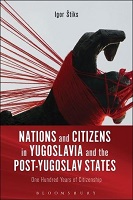Chapter Epilogue
The Citizenship Argument – Why Are We in This Together?
| dc.contributor.author | Štiks, Igor | |
| dc.date.accessioned | 2018-08-08 11:51:57 | |
| dc.date.accessioned | 2020-04-01T13:09:13Z | |
| dc.date.accessioned | 2017-12-01 23:55:55 | |
| dc.date.accessioned | 2018-08-08 11:51:57 | |
| dc.date.accessioned | 2020-04-01T13:09:13Z | |
| dc.date.available | 2020-04-01T13:09:13Z | |
| dc.date.issued | 2015 | |
| dc.identifier | 642981 | |
| dc.identifier | OCN: 1030821761 | en_US |
| dc.identifier.uri | http://library.oapen.org/handle/20.500.12657/30748 | |
| dc.description.abstract | ‘Who is in and who is out? – these are the first questions that any political community must answer about itself’ (Walzer 1993: 55). We can agree with Michael Walzer on this point, but there is one important question that precedes asking who is in and who is out and that is, why are we in this together in the first place? How did a concrete political community come into being, and why does it still exist? How does a person find himself or herself in a particular community whose members are then recognized as co-citizens? And, are we all satisfied with the existing legal, political and social arrangements within the shared polity? Maybe we want our political community to be organized differently, or we want to belong to an entirely different community, one that exists or the one that is yet to be? In short, every political community is confronted with the why of its existence, having to convince its members – or at least a good portion of them – that they do belong together. This is what I call the citizenship argument of a political community. | |
| dc.language | English | |
| dc.subject.classification | thema EDItEUR::J Society and Social Sciences | en_US |
| dc.subject.classification | thema EDItEUR::J Society and Social Sciences::JP Politics and government | en_US |
| dc.subject.other | epilogue | |
| dc.subject.other | epilogue | |
| dc.subject.other | Breakup of Yugoslavia | |
| dc.subject.other | Ethnic group | |
| dc.subject.other | Ethnic nationalism | |
| dc.subject.other | Ethnocentrism | |
| dc.subject.other | Kosovo Albanians | |
| dc.subject.other | Multinational state | |
| dc.subject.other | Serbia | |
| dc.subject.other | Serbs | |
| dc.subject.other | Socialist Federal Republic of Yugoslavia | |
| dc.subject.other | Supranational union | |
| dc.title | Chapter Epilogue | |
| dc.title.alternative | The Citizenship Argument – Why Are We in This Together? | |
| dc.type | chapter | |
| oapen.identifier.doi | 10.5040/9781474221559.ch-012 | |
| oapen.relation.isPublishedBy | 066d8288-86e4-4745-ad2c-4fa54a6b9b7b | |
| oapen.relation.isPartOfBook | 652c73a7-2e3d-4da9-8af8-4cde5d8e61a4 | |
| oapen.relation.isFundedBy | FP7 Ideas: European Research Council | |
| oapen.collection | European Research Council (ERC) | |
| oapen.pages | 187-193 | |
| oapen.pages | 6 | |
| oapen.place.publication | London | |
| oapen.chapternumber | 11 | |
| oapen.grant.number | 230239 | |
| oapen.grant.acronym | CITSEE | |
| oapen.grant.program | FP7 | |
| oapen.remark.public | Relevant Wikipedia pages: Breakup of Yugoslavia - https://en.wikipedia.org/wiki/Breakup_of_Yugoslavia; Ethnic group - https://en.wikipedia.org/wiki/Ethnic_group; Ethnic nationalism - https://en.wikipedia.org/wiki/Ethnic_nationalism; Ethnocentrism - https://en.wikipedia.org/wiki/Ethnocentrism; Kosovo Albanians - https://en.wikipedia.org/wiki/Kosovo_Albanians; Multinational state - https://en.wikipedia.org/wiki/Multinational_state; Serbia - https://en.wikipedia.org/wiki/Serbia; Serbs - https://en.wikipedia.org/wiki/Serbs; Socialist Federal Republic of Yugoslavia - https://en.wikipedia.org/wiki/Socialist_Federal_Republic_of_Yugoslavia; Supranational union - https://en.wikipedia.org/wiki/Supranational_union | |
| oapen.identifier.ocn | 1030821761 |

